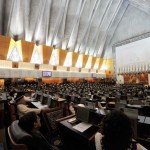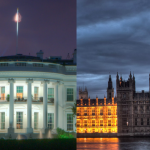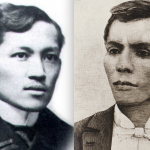Chapter II – Rights
Article 17. No person shall be deprived of life, liberty, or property without due process of law, nor shall any person be denied the equal protection of the laws.
Article 18. No human being shall be denied recognition as a person under the law. The State shall protect the right of every human being to physical, mental, and moral integrity, and shall ensure that no person shall be subjected to torture or other inhuman or degrading treatment.
Article 19. Nobody can enter the place of residence of any person without his consent, except in urgent cases of fire, flood, earthquake or any similar danger, or of unlawful aggression coming from within, or in order to help any person who therein asks for help.
Other than the cases mentioned in the preceding paragraph, the right of the people to be secure in their persons, residences, papers, and effects against unreasonable searches and seizures of whatever nature and for any purpose shall be inviolable, and no search warrant or warrant of arrest shall issue except upon probable cause to be determined personally by the judge after examination under solemn affirmation of the complainant and the witnesses he may produce, and particularly describing the place to be searched and the persons or things to be seized.
The search of papers and effects shall only be executed in daytime, and always be made in the presence of the person concerned or any member of his family and, in their absence, of two witnesses from the same neighborhood.
However, should a delinquent caught in fraganti and pursued by the authorities through their agents take refuge in his place of residence, these agents can enter therein for the sole purpose of carrying out the arrest. Should the delinquent seek refuge in another person’s residence, permission must be first obtained from its owner.
Article 20. The privacy of individuals shall be inviolable. However, upon lawful order of the court, or when public safety or order requires otherwise as prescribed by law, a correspondence may be withheld, and whatever message sent may be opened in the presence of the defendant.
Article 21. Any evidence obtained in violation of Articles 19 and 20 shall be inadmissible for any purpose in any proceeding.
Any warrant to arrest, to search a place of residence and to withhold correspondence must be duly justified. Should the warrant lack this requisite, or when the motives on which such warrant has been based are declared illegal or notoriously insufficient by a court, the person that has been imprisoned or whose imprisonment has not been ratified within the period required in Article 31, or whose place of residence has been searched, or whose correspondence has been withheld, will have the right to file for corresponding damages.
Article 22. No law shall be passed abridging the responsible exercise of the freedom of speech, of expression, or of the press, or the right of the people peaceably to assemble and petition the Government for redress of grievances.
Article 23. The liberty of abode and of changing the same within the limits prescribed by law shall not be impaired except upon lawful order of the court. Any Filipino, who is in full enjoyment of his political and civil rights, cannot be prevented from leaving Philippine territory freely, nor can he be hindered from transferring his residence and properties to a foreign country, except when he is required to render military service or maintain public charges.
Article 24. The right of the people to the writ of habeas data and to information on matters of public concern shall be recognized. Access to official records, and to documents and papers pertaining to official acts, transactions, or decisions, as well as to government research data used as basis for policy development, shall be afforded the citizen, subject to such limitations as may be provided by law.
Article 25. The right of the people to form unions, associations, or societies for purposes not contrary to law shall not be abridged.
Article 26. Private property shall not be taken for public use without just compensation.
Article 27. No law impairing the obligation of contracts shall be passed.
Article 28. Free access to the courts and quasi-judicial bodies and adequate legal assistance shall not be denied to any person by reason of poverty.
Article 29. Any person under investigation for the commission of an offense shall have the right to be informed of his right to remain silent and to have competent and independent counsel preferable of his own choice. If the person cannot afford the services of counsel, he must be provided with one. These rights cannot be waived except in writing and in the presence of counsel.
No torture, force, violence, threat, intimidation, or any other means, which vitiate the free will shall be used against him. Secret detention places, solitary, incommunicado, or other similar forms of detention are prohibited.
Any confession or admission obtained in violation of this or Article 34 hereof shall be inadmissible in evidence against him.
The law shall provide for penal and civil sanctions for violations of this article as well as compensation to the rehabilitation of victims of torture or similar practices, and their families.
Article 30. All persons, except those charged with offenses punishable by reclusion perpetua when evidence of guilt is strong, shall, before conviction, be bailable by sufficient sureties, or be released on recognizance as may be provided by law. The right to bail shall not be impaired even when the privilege of the writ of habeas corpus is suspended. Excessive bail shall not be required.
Article 31. No person shall be detained to answer for a criminal offense without due process of law. Any detainee shall either be set free, or be given judicial authority within the next twenty-four hours following the act of detention. Any detention shall either be rendered without effect, or be raised to imprisonment within seventy-two hours of the detainee being handed over to a competent court. The interested party shall be dully notified within the same period of whatever decision pronounced.
No person can be imprisoned except by virtue of a warrant issued by a competent court. The order through which the warrant has been pronounced shall be ratified or revised, after having heard the accused, within seventy-two hours following the act of imprisonment.
In all criminal prosecutions, the accused shall be presumed innocent until the contrary is proved, and shall enjoy the right to be heard by himself and counsel, to be informed of the nature and cause of the accusation against him, to have a speedy, impartial, and public trial, to meet the witnesses face to face, and to have compulsory process to secure the attendance of witnesses and the production of evidence in his behalf. However, after arraignment, trial may proceed notwithstanding the absence of the accused provided that he has been duly notified and his failure to appear is unjustifiable.
Article 32. The privilege of the writs of habeas corpus, habeas data, or amparo shall not be suspended except in cases of invasion or rebellion when the public safety requires it.
Article 33. All persons shall have the right to a speedy disposition of their cases before all judicial, quasi-judicial, or administrative bodies.
Article 34. No person shall be compelled to be a witness against himself.
Article 35. No person shall be detained solely by reason of his political beliefs and aspirations.
No involuntary servitude in any form shall exist except as a punishment for a crime whereof the party shall have been duly convicted.
Article 36. Excessive fines shall not be imposed, nor cruel, degrading or inhumane punishment inflicted. No person shall be subjected to any penalty greater than imprisonment beyond twelve years or its equivalent punishment, except upon conviction by competent civil court for specific act constituting a crime committed with malicious intent.
Capital punishment shall never be imposed for any crime.
The employment of physical, psychological, or degrading punishment against any prisoner or detainee or the use of substandard or inadequate penal facilities under subhuman conditions shall be dealt with by law.
Article 37. No person shall be imprisoned for debt or non-payment of a poll tax.
Article 38. No person shall be twice put in jeopardy of punishment for the same offense. If a law and an ordinance punish an act, conviction or acquittal under either shall constitute a bar to another prosecution for the same act.
Article 39. No ex post facto law or bill of attainder shall be enacted, and no person shall be detained solely by reason of his religious, ideological, political, or other beliefs.
Article 40. No limitation in the extent or application of the rights in this chapter shall be permitted except insofar as this Constitution expressly allows. A foreign national within the Philippines shall exercise the rights provided in this chapter to the same extent as a Philippine citizen, except insofar as they directly relate to political and economic acts limited by express provision of law.
Article 41. The rights under this chapter shall be enforceable against the State, its organs, and its officers, and as the law provides, against private parties; provided that, even without statutory provision, the rights guaranteed under Articles 17, 18, 36, 37, and 38 shall in all cases be enforceable against private persons and constitute grounds for civil liability.




 I believe: This is a CoRRECT™ Video with a very positive message
I believe: This is a CoRRECT™ Video with a very positive message Walang Natira: Gloc-9's MTV Rap about the OFW Phenomenon
Walang Natira: Gloc-9's MTV Rap about the OFW Phenomenon

























“Article 20. The privacy of communication and correspondence shall be inviolable. However, upon lawful order of the court, or when public safety or order requires otherwise as prescribed by law, a correspondence may be withheld, and whatever message sent may be opened in the presence of the defendant.”
Can we modify this to be more expansive? How about “The privacy of individuals shall be inviolable.”? It’s not just “communication and correspondence” we want to protect. We also need to protect individual data like medical records, and prevent government from installing cameras in our homes.
You’re right, Carlos. The text used in this article is adopted from the 1899 Malolos Constitution, which is of course long before other forms of electronic media. The original Malolos text included correspondences with the postal services and the telegraph. In an attempt to be more all-encompassing, I had settled for “communication and correspondence”, but forgot in the meantime that privacy today should also include cameras, electronic data, etc.. So unless there are any objections within the next couple of days, I will change this accordingly.